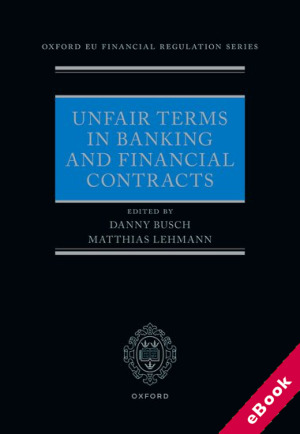
The device(s) you use to access the eBook content must be authorized with an Adobe ID before you download the product otherwise it will fail to register correctly.
For further information see https://www.wildy.com/ebook-formats
Once the order is confirmed an automated e-mail will be sent to you to allow you to download the eBook.
All eBooks are supplied firm sale and cannot be returned. If you believe there is a fault with your eBook then contact us on ebooks@wildy.com and we will help in resolving the issue. This does not affect your statutory rights.
This timely new work provides a thorough overview, analysis, and discussion of standard terms control for banking and financial contracts in Europe. Unfair Terms in Banking and Financial Contracts argues that this sector uniquely necessitates unfair terms control, due to the asymmetrical relationship between lay consumers and the financial industry and discusses the role of the judiciary in addressing this imbalance.
The rise of unfair terms control as a remedy for consumers and businesses against financial institutions with superior bargaining power has led to questions about the Directive's threat to existing contracts. Disputes have already arisen across Europe in several areas including foreign currency housing loans, housing loans based on Euribor, and hidden bank fees. These disputes and their outcomes are high stakes for banks and their customers. The stakes of the outcomes of these disputes for the customers as well as for the banks are very high.
The book focuses on the EU Unfair Terms Directive (UTD) but also considers the law of non-EU jurisdictions. Beginning with an overview of the UTD and the extensive case law of the CJEU, the volume brings together leading authorities in the field of financial law to provide analyses of the UTD's application in this sector across 15 EU jurisdictions (Ireland, Germany, France, Italy, Spain, Austria, The Netherlands, Belgium, Sweden, Greece, Poland, Romania, Czech Republic, Hungary, and Estonia). It then goes on to compare the legal situation in three non-EU jurisdictions (United Kingdom, Switzerland, and Norway).
Locating unfair terms control within a broader European struggle to balance the power of market forces and the requirements of social justice, the volume offers a critique of the existing regime and concludes with a proposal for a common legal framework to ensure a level playing field and greater harmonisation across the EU.